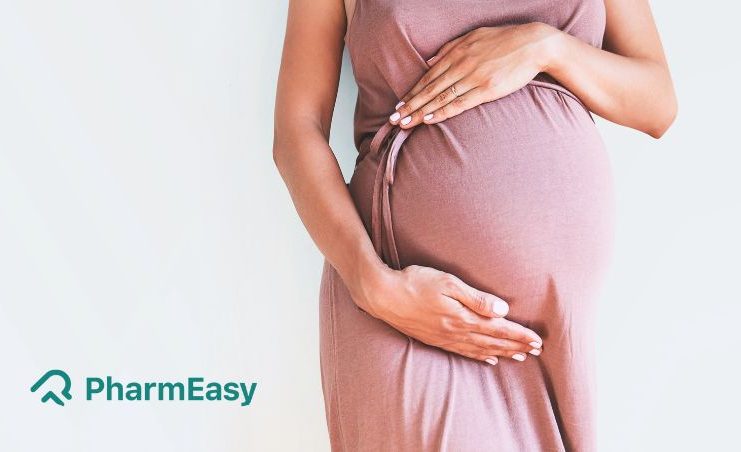Impact of Anaemia on Pregnancy: Important Tips for Expecting Mothers
By Saksham Bhatia +2 more

Get more insightful and
helpful tips to
treat Diabetes for FREE



Download PharmEasy App




Register to Avail the Offer
Send OTPBy continuing, you agree with our Privacy Policy and Terms and Conditions
By Saksham Bhatia +2 more
Table of Contents
Anaemia is a condition characterised by a low or abnormal number of red blood cells. In a complete blood count test, anaemia can be indicated by low RBC count t or low haemoglobin. Haemoglobin is a very important protein found in red blood cells that carry oxygen and deliver it to various parts of the body.

Iron-deficiency anaemia is the most commonly occurring anaemia in women. This happens when the body doesn’t have sufficient iron needed to create haemoglobin. When there is insufficient iron in the blood, the rest of the body doesn’t get the required oxygen it needs. According to a survey carried out by the Global Burden of Disease (GBD), iron deficiency anaemia continues to be a pressing health burden in India for the past decade. Iron deficiency anaemia during pregnancy affects the health of the mother as well as that of the foetus.
The World Nutrition Assessment 2016 found that India had the highest incidence of iron deficiency anaemia. Out of 180 nations of women with anaemia, India ranked 170th. In women of reproductive age group (15-49 years), the standard reason for iron deficiency anaemia was a loss of iron through blood during menstrual cycles or during pregnancy, inadequate iron intake and frequent infections.
At the time of pregnancy particularly, the blood volume in the body increases. The demand for iron stores also increases in order to be able to supply oxygen to the baby. When there is a demand and supply gap, the possibility of developing iron deficiency anaemia arises. As a result, mothers have a chance of suffering from preeclampsia (high blood pressure disorder), perinatal infection and bleeding.
Listed below are some risk factors that put an expecting mother at high risk of getting this condition.
A major reason why sometimes iron deficiency anaemia gets ignored at the time of pregnancy is because the symptoms are similar to that of general pregnancy. However, if you are concerned about the degree of weakness that you are feeling on a daily basis despite getting adequate rest, you should speak to your healthcare provider.
Some symptoms of iron deficiency anaemia are:
Iron deficiency anaemia during pregnancy is very risky for the baby because it increases the danger of not only premature birth but also infant death after or before birth. Some other complications of iron deficiency anaemia that the baby can develop are below:
If you are found to be anaemic during your pregnancy due to iron deficiency, you will be prescribed by your doctor to take folic acid tablets or iron supplements in addition to prenatal vitamins. You will also be asked to undergo regular blood tests in order to track if the haemoglobin levels are improving.
The doctor will also suggest that the expecting mother consume more iron and protein-rich food during their pregnancy, such as paneer, lentils, spinach, fresh fruits, eggs, chicken, liver, and dairy products.
Your obstetrician may also refer you to a haemotologist who specialises in blood disorders in order to get more specialised attention with respect to improving your health.
In order to manage anaemia from the very beginning, you should be careful about meeting the body’s need for iron through dietary means. Consuming well-balanced home cooked-food should be your primary goal. You should aim for a minimum of three servings of iron-rich meals such as:
You should also consume a good quantity of vitamin C daily in order to ensure proper iron absorption. Such foods must include citrus fruits, tomatoes, bell peppers, and kiwis. Another tip that expecting mothers should follow is to consume an iron-rich meal along with a plate of tomato salad or other citrus fruit high in vitamin C in one go. This ensures that the iron contained in food is adequately absorbed by the body.
Besides this, you should speak to your healthcare provider about taking iron supplements and prenatal vitamins in the right dosage to prevent supplement toxicity.
If you have plans to become a mother in the near future or you are already pregnant, you should be fully aware of the importance of folic acid, iron and vitamin B12 for the proper functioning of the body. You must ideally get a full body check-up done, including a complete blood count test, prior to conceiving or as soon as possible. Pay attention to any nutritional gap that you may have.
Speak to your healthcare provider about taking micro supplements such as prenatal vitamin or iron tablets and follow a well-balanced diet comprising protein, iron and vitamin C. Additionally, as a good samaritan, you can pass on the knowledge of iron deficiency anaemia during pregnancy to your loved ones so that they can also fight this condition and enjoy a healthy pregnancy.
Disclaimer: The information included on this site is for educational purposes only and is not intended to be a substitute for medical treatment by a healthcare professional. Because of unique individual needs, the reader should consult their physician to determine the appropriateness of the information for the reader’s situation.
Sources:
https://www.nhm.gov.in/images/pdf/programmes/child-health/guidelines/Control-of-Iron-Deficiency-Anaemia.pdf
https://pib.gov.in/PressReleasePage.aspx?PRID=1795421
https://www.hematology.org/education/patients/anemia/iron-deficiency
https://www.mayoclinic.org/healthy-lifestyle/pregnancy-week-by-week/in-depth/anemia-during-pregnancy/art-20114455#:~:text=During%20pregnancy%2C%20you%20need%2027,vegetables%2C%20dried%20beans%20and%20peas.
https://www.ncbi.nlm.nih.gov/pmc/articles/PMC4375689/
Comments